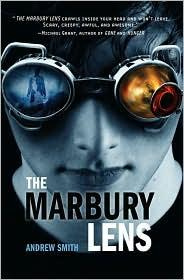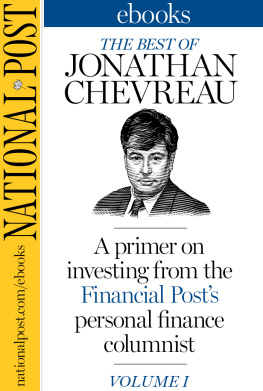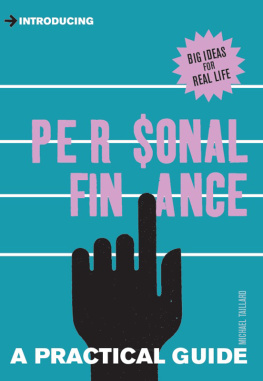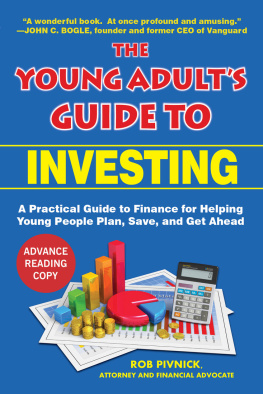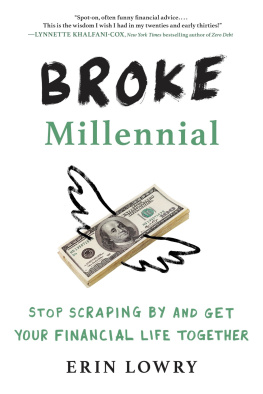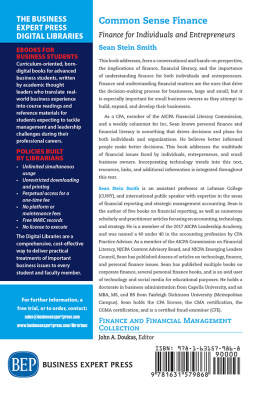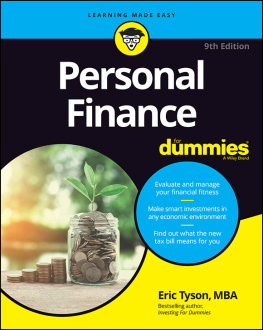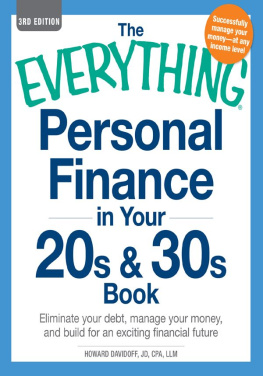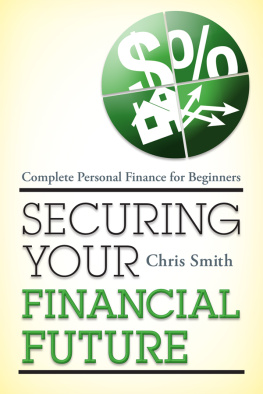Financial Literacy for Millennials

A Practical Guide to Managing Your Financial Life for Teens, College Students, and Young Adults
Andrew O. Smith

Copyright 2016 by Andrew O. Smith
All rights reserved. No part of this publication may be reproduced, stored in a retrieval system, or transmitted, in any form or by any means, electronic, mechanical, photocopying, recording, or otherwise, except for the inclusion of brief quotations in a review, without prior permission in writing from the publisher.
Library of Congress Cataloging-in-Publication Data
Names: Smith, Andrew O., 1962 author.
Title: Financial literacy for millennials : a practical guide to managing your financial life for teens, college students, and young adults / Andrew O. Smith.
Description: Santa Barbara : Praeger, 2016. | Includes index.
Identifiers: LCCN 2016015425 | ISBN 9781440834028 (hardcopy : alk. paper) | ISBN 9781440834035 (ebook)
Subjects: LCSH: Finance, Personal.
Classification: LCC HG179 .S5384 2016 | DDC 332.024dc23
LC record available at https://lccn.loc.gov/2016015425
ISBN: 978-1-4408-3402-8
EISBN: 978-1-4408-3403-5
20 19 18 17 16 1 2 3 4 5
This book is also available as an eBook.
Praeger
An Imprint of ABC-CLIO, LLC
ABC-CLIO, LLC
130 Cremona Drive, P.O. Box 1911
Santa Barbara, California 93116-1911
www.abc-clio.com
This book is printed on acid-free paper 
Manufactured in the United States of America
Contents
Acknowledgments
This book started as a letter.
A relative asked me to spend some time talking about money with his daughter, a doctor who was newly married to another doctor. They turned out to be the perfect objects of a personal-finance education: intelligent, responsible, successful, and high earners. Unfortunately, like many intelligent people with good incomes, they were too busy to learn how to be smart about their money, and they werent particularly interested in doing so, either. Over a lifetime of following the financial press and marveling every time I would read about a financial scam or some sophisticated investment fraud, I noticed that doctors were often among the victims. Then it made sense: they had lots of money but spent little time learning how to handle it properly.
After several unsuccessful attempts to engage the young doctors in a conversation about their finances, I decided to write them a letter. Over a few weeks, I considered the important things that young people should know about money, some of which I had learned through education and training, others that had come to me naturally through my experiences advising others, and some I had learned the hard way. The result was a 10-page letter setting out a basic course in financial literacy for young adults. This letter led to a series of conversations with the young couple, and from all evidence it appears to have done them good. It didnt turn them into readers of the Wall Street Journal , fans of Mad Money , or subscribers to Kiplinger magazine, but it did make them think about their life goals, how money would figure into achieving them, and why they should take personal finance more seriously.
I benefitted greatly from the extensive comments given me by the primary readers of this book in draft form: Jeff Henderson, Ragan Memmott, David Roberts, and Sally Zuckert. I was also helped by comments from Bernie Ostrowski and Hope Wolman, who reviewed small sections of the book. Thank you all. I thank my agent, Steve Hutson, and the people at Praeger/ABC-CLIO for recognizing the importance of this topic and for having confidence in my ability to make a useful addition to the literature. I am grateful to my family for supporting my writing efforts over an extended period of time and for tolerating the impacts on our family life. Most of all I thank my great-grandparents, who had the courage and wisdom to immigrate to the United States, allowing me the great privilege to be a citizen of this country and adopt the financial habits of thrift, skepticism, and self-reliance that are the natural inheritance of all New Englanders.
PROLOGUE
A Tale of Two Teens
Wendy was a fairly typical high school student. She participated in several clubs, was an okay athlete (better than average, but no college scholarship offers), had a few good friends, worked hard in school, and got decent grades. She was pretty sure she wanted to go to college but didnt have any career goals figured out yet. Wendys parents were divorced. Her dad wasnt in the picture, but her mom was caring and provided a good home. Her high school offered a mini-class in personal finance, and although Wendy wasnt particularly interested in the topic, her mom persuaded her to take it. Although most of the mini-class didnt seem at all relevant to her, she filed away in the back of her mind some important lessons about managing her financial life.
Wendy loved music and shopping and hanging out with her friends at the mall. Because her mom didnt have a lot of extra money, Wendy babysat for local kids all through high school and got a summer job lifeguarding at the public pool. These jobs gave her spending money for the things she liked, and she was even able to save some of her earnings at the local bank. By the time she was ready to graduate from high school Wendy had almost $2,000 in her bank account. Wendys mom lived nearly paycheck to paycheck, so she couldnt help Wendy very much with college expenses. Wendy would have to rely on financial aid and loans to pay for college.
Brian was a very popular boy in high school, a leader in student government, a star athlete, and part of a local band with some of his friends. He wasnt that serious about his classes, figuring high school grades didnt matter much and that he had plenty of time to buckle down in college. Despite that attitude, his grades were still okay. Someday Brian wanted to own and operate his own restaurant. He liked food and cooking, so running a restaurant seemed like a great idea. He wasnt quite sure how college figured into the program, but decided he should go. Both of Brians parents had good jobs, so his family was comfortable financially. When his high school offered an after-school course in personal finance, Brian thought he wouldnt have any need for it, so he chose to hang out with his friends instead.
Brian spent most of his time at sports practices, rehearsing with his band, and playing video games. Even with his team commitments he had plenty of free time, and he liked being able to do what he wanted with it. During a few summers he worked construction for a friend of his dads, but he didnt like the work. His parents gave him an allowance that covered his spending money, so he didnt worry about having to work during high school. He knew that college was going to be expensive, but he wasnt focused on that part of it: it was hard enough just doing all the applications.
COLLEGE
Wendy spent a lot of time with her high school guidance counselor and decided that a smart move for her would be to start at the local community college. It offered a two-year degree program in nursing, and if she wanted to get more serious about it as a career, she could transfer to a four-year college and work toward her bachelors degree in nursing. Wendy was a little intimidated by the science classes required even for the two-year degree, but she really liked the idea of helping people, and after researching trends in the economy, discovered that nursing was likely to be a reliable and well-paying career in the years ahead. Best of all, given her limited financial resources, the community college was affordable.
Next page



